Launch MFDContinuously developed Orbiter's Multifunctional Display which calculates a necessary azimuth with which you must launch and fly your spacecraft, to reach an orbit with certain parameters. Additional features of Launch MFD:
Launch MFD is one of 20 most wanted files of all times on OrbitHangar Orbiter's addon list. As an Open Source project, Launch MFD has many contributors and 3 authors, including me.
Requires Orbiter to run. |
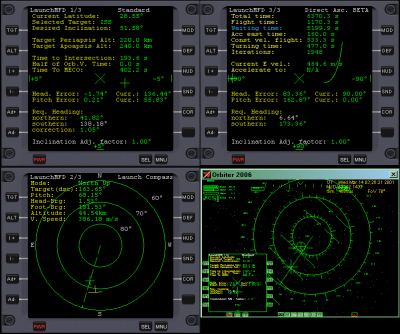 Click on the image to enlarge it. |
TransXTransX is a flexible planning and navigation tool for interplanetary transfers and orbital operations. I've temporarly taken over the legacy OSS project to implement exciting new features and fix some timely bugs. The new features include:
The solution finder has been implemented as an abstract algorithm, ready for reuse in other projects. For the solution finder to work fast, many original bottlenecks had to be removed. The bottlenecks were discovered during the process of profiling the code. Requires Orbiter to run. |
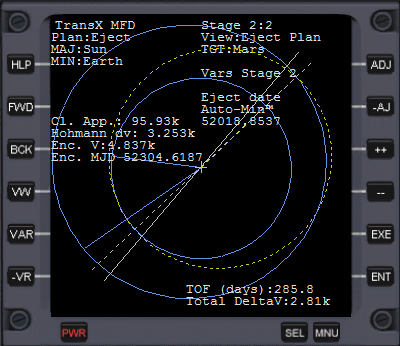
Click on the image to see the solver in action.
|
HUD Drawer SDKA library for Orbiter, which offers HUD drawing capabilities to any class, which implements a simple interface provided by the library. Registration and deregistration in the internal HUD drawing system is done automatically through exploitation of unique C++ features - constructor and destructor of the interface. The drawing system uses a hack called Virtual Table Hijacking, but the system's internals are fully encapsulated. Requires Orbiter to run. |
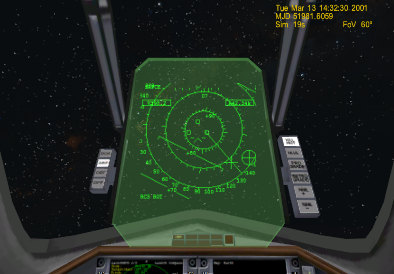 |
ModuleMessaging SDKA library for Orbiter, which offers inter-module communication capabilities. Requires Orbiter to run. |
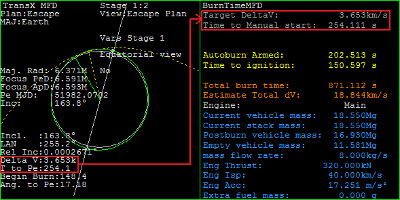 Click on the image to enlarge it. |
MDDClone-SDLAn SDL port of Mercenary games series (one of the first 3D games). SDL port means that the same code can be compiled on all platforms which support SDL. So far Windows, Mac OS X, GNU/Linux and FreeBSD ports have been created. The project is based on MDDClone's source code, but contains my own improvements, with OpenGL version being the most important one. For historical and compatibility reasons, a software rendering version is kept, using conditional compilation. |
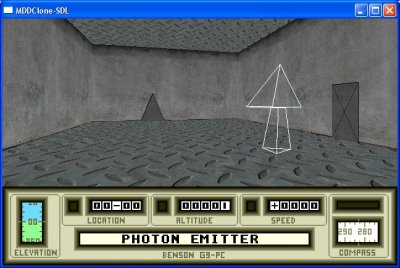 Click on the image to enlarge it. |
Killers Behind YouA 2D platform game, written in C++ language, using SDL and OpenGL libraries. The game is distinguished by its cartoon graphics, a dynamic and smooth camera and a realistic (in sanity boundaries) physics. Together with the project's artist, Paweł Zięcik, we've merged the best ideas from other platform games with our own into one game. The game works on Windows and GNU/Linux operating systems. |
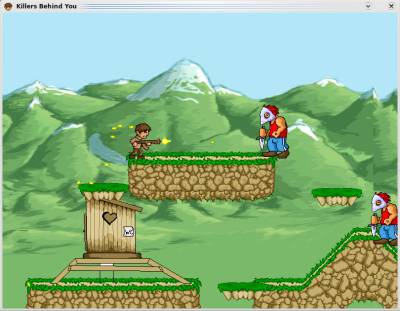 Click on the image to enlarge it. |
Killers Behind You level editorKillers Behind You level editor written in C++ language, using wxWidgets library. The editor imports and exports XML formated level data, which are then used by the Killers Behind You game itself. |
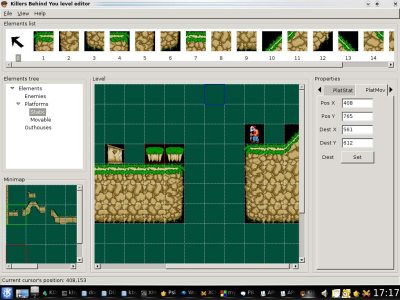 Click on the image to enlarge it. |
Database test programsA collection of database programs, written in purpose of training of writing commercial programs. The created programs' types range from console client-server apps and graphical user interface apps in WinAPI and in the multiplatform wxWidgets library. The following database engines were used: MySQL and SQLite. The project is being developed together with Szymon Cichy thanks to Subversion version control system. Click on the image to enter project's gallery, where I introduce only my own programs. |
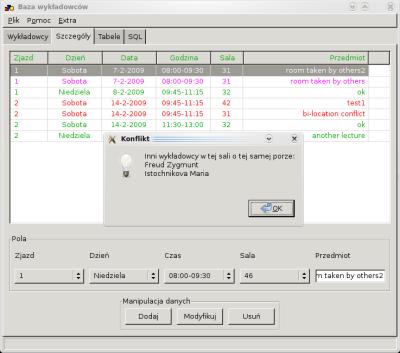 Click on the image to enter project's gallery. |
Estate agency's databaseA program which allows entering clients' estate purchase expectations into a database, then, in a handy search page, allows to search these clients, by providing information about a concrete sell offer. A typical search may be carried out by searching entries that are of a certain type, places, parameters, and that have a certain feature or don't have a specific feature, that don't suit a given client. |
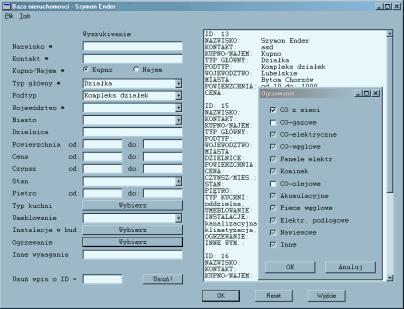 Click on the image to enlarge it. |
Energy MFD mk2Energy MFD mk2 is a tool which samples your kinetic (KE), potential (PE) energies, and their sum - mechanical energy (ME). The stored data is drawn on graphs, giving you a nice view of your energy states. The MFD is mainly an educational tool, which allows for carrying out some interesting physical experiments, described in documentation. C++ source code and Windows binary. |
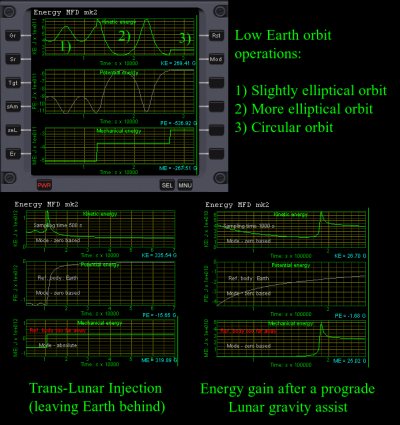 Click on the image to enlarge it. |
Orbitrader MFDMultiplayer trading module in development for Orbiter. Allows to transfer cargo between bases and space stations in the Solar System for virtual money. All transactions and events are stored on the Orbitrader server developed by Pawel "She'da'Lier" Stiasny, where the transactions are recalculated and from which the last event is downloaded next time you run the module, so it can restore the simulation's state. The project uses libxml2 library for data grouping, libcurl for the data transfers, and pthread, to provide non-blocking data transfers. |
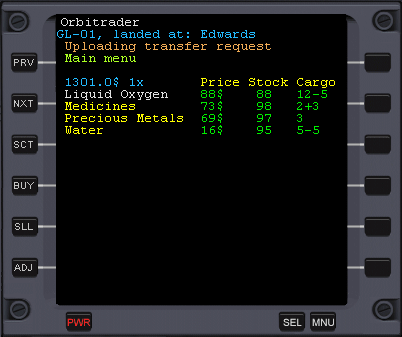 |
Orbital SceneryThis is an orbital scenery generation module. It creates and moves objects as vessels, which act as asteroids, with random velocity and rotation. Requires Orbiter to run. |
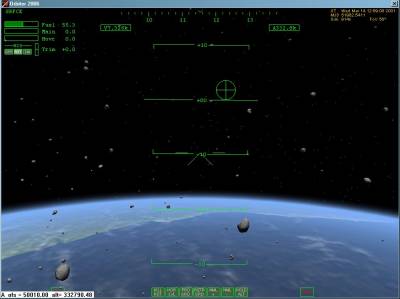 Click on the image to enlarge it. |
Direct ascent calculatorThis application serves as a visualisation of my direct ascent algorithm, used in Launch MFD. The ship's trajectory, being the calculations' result, is displayed in the graphical part of the program, while the flight's parameters in means of time are displayed in the right part of the program. The algorithm uses fuzzy logic (libFuzzyEngine++) to increase speed of numerical solving and, as such, is the subject of my Master Thesis. A detailed description is available in Launch MFD's documentation. |
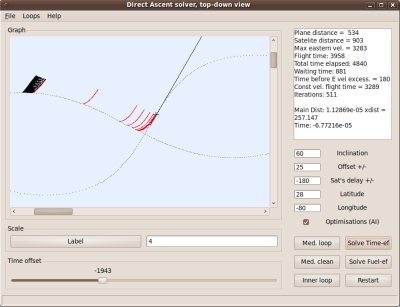 Click on the image to enlarge it. |
libFuzzyEngine++My C++ port of Prof. Edward Sazonov's Fuzzy Engine for Java. Porting the Engine from Java to C++ required some thought on how to avoid reliance on garbage collector, typical in Java / C# programming. The library itself uses a developer friendly interface in form of function definitions and linguistic rules. I used the port in Launch MFD for direct ascent algorithm's numerical solving and fuzzy autopilot.
|
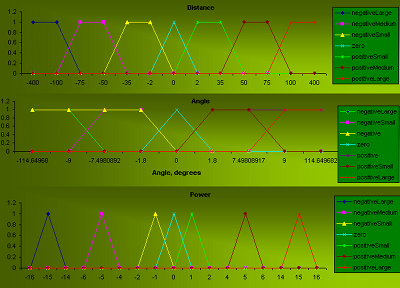 Click on the image to enlarge it. Conceptual images © Prof. Edvard Sazonov. |
Brain Party Windows portI've helped Paul Hudson from Linux Format magazine in creating Windows port of his brainteaser game - Brain Party. Porting it required making some not so obvious changes in the code, and of course preparing the binary itself, using MinGW and MSYS |
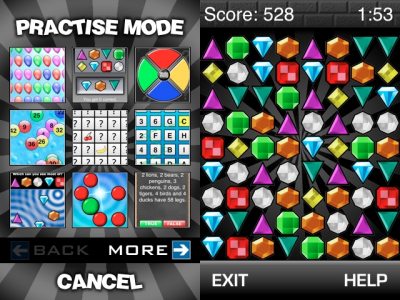 Click on the image to enlarge it. |